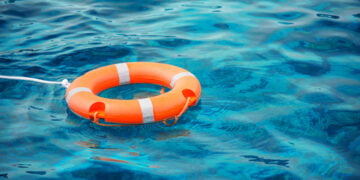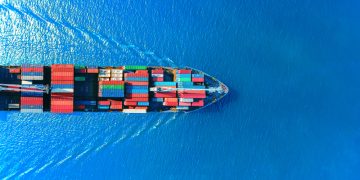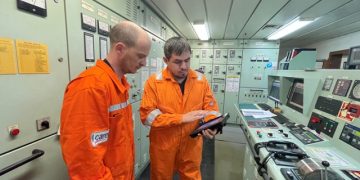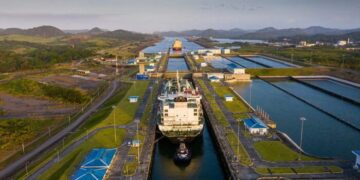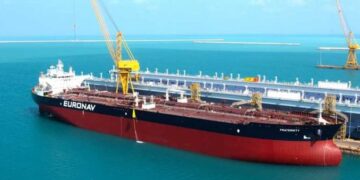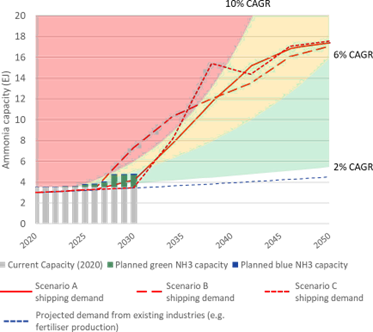UMAS released a report earlier this week which studies how unlocking much greater efficiency improvement is key to aligning shipping to 1.5ºC by 2030.
Taking expected growth in demand for international shipping into account, the report considers four scenarios with relatively low levels of fuel substitution by 2030, and then derives from them fuel substitution scenarios accounting for the amount of energy efficiency improvement required to meet the target of 37% absolute lifecycle emission reduction by 2030 (on 2008 baseline).
According to UMAS, aligning international shipping’s level of ambition with 1.5°C requires significant absolute greenhouse gas (GHG) emissions reduction by 2030 and 2040: 37% and 96% reductions respectively relative to 2008. Efficiency improvements reduce the demand for energy, and in turn, make the transition away from fossil fuels easier.
Achieving these reductions requires the parallel activities of maximizing energy efficiency and transitioning away from the use of fossil fuels in international shipping. Both of these steps are needed for both the existing fleet and new ships built during this period.
The 2040 target is dependent on the scale-up of new energy supply chains in the next decades thus, developing these supply chains and fostering use of new fuels on ships this decade is important. However, given the short timescale between now and 2030 means, new energy supply chains are unlikely to play a significant role in achieving 1.5°C-aligned 2030 ambitions; therefore, the role of energy efficiency is key in the near-term.
At present the 2030 ambition/target and by association the efficiency opportunity, are not getting the attention they deserve, at the expense of the industry and those it serves.
… said Tristan Smith from UMAS
Three options are identified that should each result in 1.5°C-aligned GHG emissions by 2030
Option 1: Focus only on short-term measures (e.g. the existing Carbon Intensity Indicator (CII) and Energy Existing Ship Index (EEXI) measures), and no need for mid- term measures (e.g. forthcoming new policies such as carbon pricing and/or fuel standards). Short-term measures need modification to WtW GHG emissions, requires a 12% reduction per annum (p.a.) from 2027 for the International Maritime Organization (IMO)’s CII.
Option 2: Focus short-term measures on energy efficiency improvements (to achieve a 38% average efficiency improvement 2019-2030), and focus mid-term measures on fuel substitution that lowers fuel GHG intensity ~15% by 2030. Requires a 9% reduction p.a. from 2027 for CII.
Option 3: Focus short-term measures on energy efficiency improvements and mid- term measures on fuel substitution, but using regional regulation and voluntary initiatives to drive compliance beyond the IMO thresholds (e.g. fleet average CII moves to ‘A’ band). Requires a 4.5% reduction p.a. from 2027 for CII.
Energy efficiency – the story so far
In the period 2008-2018, large GHG intensity reductions (32% lower intensity using the Energy Efficiency Operational Index (EEOI), vessel-based allocation), were achieved mainly due to speed reductions and changes in fleet composition (MEPC 79/INF.29). The period 2018-2022 has been turbulent in terms of ship operation with COVID-19 and supply chain disruption having caused fluctuations in GHG intensity, and in some cases, speed increases, which have reversed GHG intensity reductions.
Fleet composition has continued to change, with ships of higher technical efficiency and larger size offering continued scope for sustained GHG intensity reductions even if the turbulence meant that not all of these have yet been crystallized in practice.
Cumulative change from Jan 2012 in CO2 emission intensity, and contribution of ship size change of container ships, grams per ton-mile:

Fuel transition – scale at pace
Analysis in MEPC 79/INF.29 shows that any deep decarbonization of international shipping is dependent on widescale uptake of scalable zero-emission hydrogen derived fuels (including green ammonia and methanol), with a fleet capable of operating with those fuels.
The modelled finding in that paper is that ammonia is the least-cost solution for international shipping and dominates the fuel mix by 2040 in all 1.5°C-aligned scenarios.
Comparison between possible industry growth rates (starting 2025, shaded regions), current and planned capacity (bars), and projected demand for the ammonia industry (dotted lines):
However, the framing of the modelling in MEPC 79/INF.29 was constrained on operational (tank-to-wake – TtW) CO2 emissions resulting in a consequent large growth in LNG use in the short-term (before 2030) with significant WtW GHG emissions in the period to 2030, relative to business as usual (BAU) scenarios. The scenarios therefore do not evidence the viability of a 1.5°C-aligned WtW GHG 2030 target.
Getting to 1.5°C alignment by 2030
Therefore, understanding the viability of that target is dependent on answers to the following key questions:
- How much of the fuel transition might happen by 2030 and what will this mean in terms of a fuel mix?
- How much energy efficiency improvement is required to achieve the overall lifecycle GHG reduction?
- How could that energy efficiency improvement be achieved in practice?

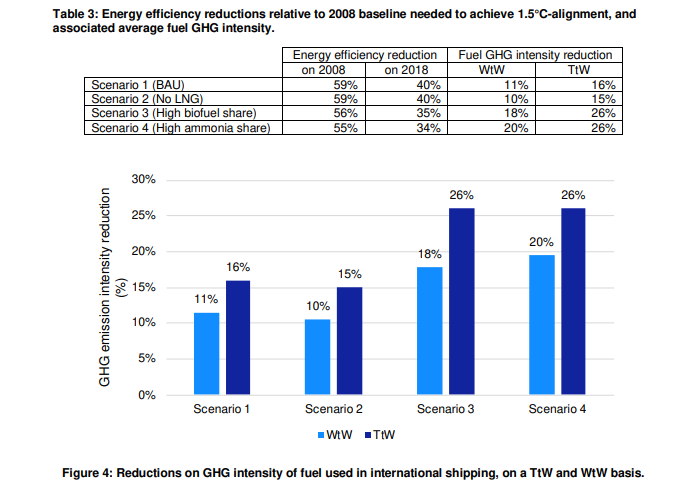
What needs to change in the supply chain for LNG, biofuel and hydrogen derived fuel?
LNG
- No changes required. The supply chain is developing under BAU for required volumes.
Biofuel
- Supply chains need stimulation to scale-up current current volumes.
Hydrogen-derived fuel
- These fuel options require significant stimulation and development and will take time to develop given their comparative lack of maturity (especially ammonia and hydrogen).
What needs to change in the energy efficiency supply chain of shipping?
- Slow steaming and virtual arrival
- Larger ships
- Wind assistance
- Maximal uptake of further energy efficiency technologies
Three ways forward
Option 1 – Set only short-term measures (no dependency on mid-term measures)
- Modify existing measures to act on WtW GHG reduction to achieve 65% reduction by 2030 against 2008
- Set CII stringency and enforcement to 12% reduction per annum from
Option 2 – Set short-term measures as well as mid-term measures
- Existing measures are focused on improving energy efficiency, and achieving 38% further improvement on 2018 efficiency level by 2030.
- This option requires CII stringency and enforcement to 9% reduction per annum from
- Mid-term measures focused on achieving bioenergy and hydrogen-derived energy substitution that lowers WtW GHG emissions ~15% by
Option 3 – Set short-term measures and mid-term measures that are both enhanced by regional regulation and voluntary initiatives
- Existing measures are focused on improving energy efficiency, mid-term measures incentivize fuel transition.
- Regional regulation and voluntary initiatives drive fleet average performance to CII ‘A’ rating and enhance fuel substitution above levels of IMO regulation, lowering WtW GHG emissions ~15% by 2030, achieving 38% further improvement on 2018 efficiency by
- Requires CII stringency and enforcement to 5% reduction per annum from 2027.








